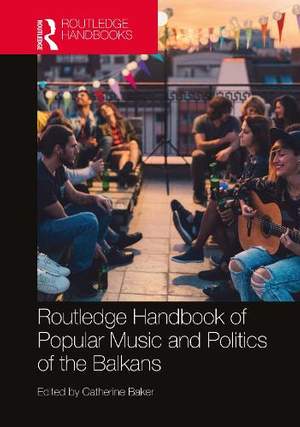
Pre-order,The Routledge Handbook of Popular Music and Politics of the Balkans
- Editor: Baker, Catherine
Book
$308.50Contents
- List of figures
- List of tables
- List of contributors
- Acknowledgements
- Introduction: Thinking Politically with Popular Music of the Balkans
- Part 1: Region and ‘the Balkans’ in Practice
- 1 The Emergence of the World Music Concept in the Balkans: Early and More Recent Steps
- 2 Lăutari, Music-Making, and Social Practices of Live Performance in Southern Romania
- 3 Politics, Activism, and Romani Music: Interpreting Trends in Serbia, North Macedonia and Bulgaria
- 4 Electronic Dance Music Festivals in Romania: a Case of Reversed Balkanism
- 5 The Balkans in the Eurovision Song Contest
- Part 2: Reviving and Revising Histories
- 6 Reviving Nineteenth-Century Wallachian and Moldavian Urban Music
- 7 Bosnian Discography Before World War I: Recording Artists, Repertoire and Politics
- 8 The Development and Institutionalization of Albanian Music During the Communist Period
- 9 ‘Please, Mile, Don’t Sing Anything Political’: Turbo-Folk, Politics and the Restoration of Capitalism in Serbia
- 10 The Artistic Units of the Army of the Republic of Bosnia-Herzegovina (ARBiH), Popular Patriotic Music Production and the Question of National Identity in Bosnia-Herzegovina During the War from 1992 to 1995
- 11 The Politics of Performance and Popular Music in Turkey
- 12 Songs After Genocide: Music of Hatred and Triumphalism
- Part 3: Defining ‘the Popular’
- 13 Popular Music and the ‘Mass Culture’ of Socialist Yugoslavia in the Eyes of Critics and Theorists
- 14 To traghoúdhi tou nekroú adelfoú: Mikis Theodorakis’ Autoethnographic and Political Perspectives in a Contemporary Greek Laiki Tragedy
- 15 Groovy Aesthetics, Intercultural Perspectives, and the Rise of Ethnojazz in Bulgaria
- 16 The Sound of Distinction: Social Class and Political Orientations as Predictors of Music Taste in Croatia
- 17 Popular Culture and Pandemic Politics: Musically Mitigating COVID-19 in 2020 Bulgaria
- Part 3: Political Economies and Political Aesthetics
- 18 Women and Gender in the Early Record Industry in Former Yugoslavia: Snapshots of Singers, a Composer, Industrial Manpower, and Gendered Humour
- 19 The Musical Film Genre in Romanian Cinema: From Melodramatic Socialism to Postmodern Irony
- 20 In Search of National Style: Yugoslav Popular Music Between the Balkans and the Mediterranean
- 21 How Do You Solve a Problem Like Korea?: Laibach and the Poetics of Politics
- 22 White Power Music and Antifascist Rap: Anti-System Music in Greece During the 2009–21 Crises
- 23 Popular Culture or Resistance?: Rap and Politics in Turkey Since the 1990s
- Part 4: Margins of National Identity
- 24 The Neopontic Music of Greece: Traditions of Modernity and the A/politics of Identity
- 25 Just Mediterranean, Please: Croatian Neoklapa Music and National (Re)Positioning
- 26 Between the Virtual and the Make-Believe: Anthems, Bells, and a Performance for Liberland Along the Croatian and Serbian Danube
- 27 Queering Bulgarian Pop-Folk: Hybridity, Gaga Feminism, and Defamiliarization in Chalga
- 28 Understanding Gender and Sexuality in Sevdah as a Popular Genre
- Part 5: Globalizing Postcoloniality and Race
- 29 Black Popular Musics in Yugoslavia
- 30 ‘The Blacks of Yugoslavia’: Racialization, Resistance, and Kosova’s ‘MTV Generation’
- 31 Br/otherhood and Dis/unity: Racial Differentiations Across the Former Yugoslav Region and Serbian Diaspora Communities in Serbia’s Two Major Music Festivals
- 32 What is this ‘Balkan’ in Balkan Popular Culture?: Stuart Hall’s Sociology of Popular Culture, Identity and Race through Analogy and Connection
- 33 From AfroGreeks to the Black Mediterranean: De/facing Whiteness in the Rap of Negros tou Moria
- Part 6: New Technologies and Transformations
- 34 Stacking Nightingales, Male Tears, and Albums of the Year: How the Balkans and Other Scales of Domestic Hip-Hop Are Crafted
- 35 ‘Popularity’ in the YouTube Era: an Anthropological Analysis of Music Trending on Serbian YouTube and IDJTV
- 36 From Turbo Music to Turbo Politics: Pop-Folk and Anti-Establishment Politics in Bulgaria
- 37 ‘Dajem ti srce, zemljo moja’: Patriotic Music and National Unity in Croatia in the Aftermath of the 2020 Petrinja Earthquake
- 38 ‘And Then We Sang’: Affective Communities and Russian/EU Cultural Diplomacy in Moldova’s Victory Day and Europe Day, 2022
- 39 Queer Yugosphere: Queer Audiences and Popular Music in the Post-Yugoslav Space
- Index


